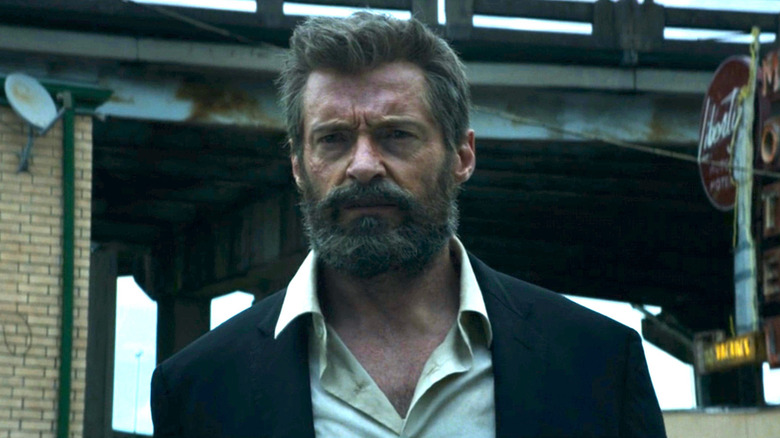Wolverine's Healing Factor Has A Tragic Side Effect Most Marvel Fans Ignore
Having giant metal claws protrude from his hands would be cool on its own, but Wolverine has another ability that puts him in his own league — a healing factor that makes him exceptionally difficult to kill. In the heat of battle, his body can recover from any gruesome injury or wound. He's had his heart ripped out, survived a nuclear detonation, and even gotten smooshed by a steamroller. While it definitely comes in handy for keeping arguably the most popular X-Man around for so long, it brings one drawback in the fact Logan outlives everyone he cares about.
Whether you're going by the movies or comic books, Wolverine has a complicated age. It's surmised he's nearly 200 years old during the events of 2017's "Logan," which would make sense given the montage in "X-Men Origins: Wolverine" where audiences see Logan (Hugh Jackman) fight in various wars throughout history in one of the coolest live-action Wolverine moments in film. However, that means all the friends and lovers he's had throughout the years pass away while he still looks young.
This is the central conceit of the "Old Man Logan" storyline from writer Mark Millar and artist Steve McNiven. Wolverine is all by himself in the Wasteland with the other X-Men gone. A similar plot was adapted to "Logan," where even though Charles Xavier (Patrick Stewart) is around at the beginning, Logan still lives primarily in isolation. Immortality may sound nice on the surface, but after centuries, it can become a fate worse than death.
Wolverine's healing factor also plays a role in his memory loss
While losing people like Jean Grey and Professor X is undoubtedly tough, that's also not getting into all of the other people Wolverine would've encountered across his centuries of life. It's no wonder he often resorts to alcohol to numb the pain, knowing he can't get close to anyone because they'll probably die long before he does. Suffice it to say, there are ways to defeat Wolverine, such as by drowning or encasing him in molten adamantium, the latter of which happens in the 2014 story arc "Death of Wolverine," by Charles Soule and Steve McNiven. But without those few external sources, Wolverine could feasibly live for millennia, constantly bearing witness to the perpetual passage of time.
There's one other aspect of Wolverine that protects from years of loss and death. Most people likely associate Logan's memory loss to the experimentation he endured from the Weapon X program. That certainly plays a role to an extent, but in the comic book series "Wolverine: Origin," from Bill Jemas, Joe Quesada, Paul Jenkins, Richard Isanove, and Andy Kubert, it's further implied that Logan's healing factor also impairs his memory to protect him from trauma. In essence, it "heals" his memories so that he doesn't have to live with all of the terrible things he's done and endured over the decades.
Even on the rare occasion when Wolverine does appear to bite the dust, it's never too long before he's resurrected in some manner. He'd probably be delighted to just stay dead, but the heroes of Earth (as well as Marvel's profit margins) require him to return sooner or later.

